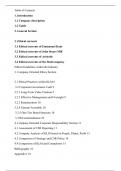Table of Contents
1. Introduction
1.1 Company description
1.2 Guide
2. General Section
3. Ethical currents
3.1 Ethical currents of Emmanuel Kant
3.2 Ethical currents of John Stuart Mill
3.3 Ethical currents of Aristotle
3.4 Ethical currents of the Shell company
Ethical Guidelines within the Industry
3. Company-Oriented Ethics Section
3.1 Ethical Practices within KLM 8
3.2 Corporate Governance Code 9
3.2.1 Long-Term Value Creation 9
3.2.2 Effective Management and Oversight 9
3.2.3 Remuneration 10
3.2.4 General Assembly 10
3.2.5 One-Tier Board Structure 10
3.3 Recommendations 10
4. Company-Oriented Corporate Responsibility Section 11
4.1 Assessment of CSR Reporting 11
4.2 Company Analysis of KLM based on People, Planet, Profit 13
4.3 Comparison of Strategy and CSR Policy 14
4.4 Comparison of KLM and Competitors 15
Bibliography 16
Appendix I 18
,1. Introduction
1.1 Company description
The research below will cover the multinational energy company Shell.
Shell is a leading global energy company operating in various sectors, including oil,
gas, and renewable energy sources (Shell, 2022). With a rich history dating back to
its establishment in 1907, Shell has evolved into one of the largest corporations
worldwide.
Shell operates in numerous countries, engaging in exploration, production, refining,
and distribution of petroleum products (Shell, 2022). The company's diverse portfolio
encompasses activities in oil and gas exploration and production, refining and
marketing, as well as the development of new energy technologies (Shell, 2022).
Recognizing the importance of sustainability and clean energy, Shell is actively
involved in initiatives related to renewable energy sources such as wind power and
biofuels (Shell, 2022). Through strategic partnerships and investments in research
and development, the company strives to play a significant role in addressing global
energy challenges and shaping the future of the energy industry (Shell, 2022).
With a strong workforce of over 80,000 employees worldwide, Shell places emphasis
on safety, environmental responsibility, and social contribution in the communities it
operates in. The company's annual report provides detailed insights into its financial
performance, sustainability practices, and corporate social responsibility efforts.
By prioritizing innovation and sustainable practices, Shell aims to meet the growing
global energy demand while minimizing its environmental impact. The company's
commitment to responsible energy production and its contribution to economic and
social development align with its business objectives and broader societal goals.
1.2 Guide
The research will be conducted in four chapters. In the second chapter, a thorough
examination of the overall oil and gas industry will be conducted. This analysis will
, include an exploration of the ethical guidelines that are applicable within the industry.
Furthermore, the chapter will delve into how these guidelines are evaluated and
enforced within Shell. Practical examples will be provided to illustrate the
implementation of ethical guidelines and practices within the company.
In the third chapter, the focus will be on the ethical practices carried out by Shell.
This section will examine whether Shell possesses or meets the requirements to
qualify for the "Corporate Governance Code," a set of guidelines and principles that
promote transparency, accountability, and good corporate governance. It will explore
Shell's adherence to these standards and assess its commitment to responsible
business practices.
The fourth and final chapter of the study will specifically focus on the aspect of
"responsible entrepreneurship" within Shell. This chapter will involve assessing
Shell's Corporate Social Responsibility (CSR) reporting, following the guidelines set
by the Global Reporting Initiative (GRI).
Furthermore, the fourth chapter will include a comparison between Shell's current
strategy and its CSR policy. By evaluating the alignment between the company's
strategic goals and its commitment to responsible entrepreneurship, a comprehensive
understanding of Shell's approach to sustainable business practices will be developed.
The research will utilize the framework of the three P's (People, Planet, Profit) the
research will delve into the areas where Shell demonstrates responsible business
practices. The study will examine Shell's initiatives and activities that prioritize the
well-being of people, environmental sustainability, and economic viability.
2. General Section
2.1 Ethical Guidelines within the Industry
The second chapter of Shell's corporate governance framework will delve into the
general section, which encompasses ethical guidelines relevant to the company's
operations within the industry. This chapter will provide a comprehensive description
and analysis of the ethical guidelines governing aviation, with a specific focus on the
guidelines and the guidelines established by Dutch regulatory authorities. It will
explore the principles and practices outlined in these guidelines, highlighting their
significance in promoting responsible and ethical conduct within Shell's aviation
operations. By addressing these industry-specific ethical considerations, Shell aims to
ensure compliance with international and national standards, prioritize safety, and
uphold its commitment to sustainability and responsible business practices within the
aviation sector.
Shell is committed to maintaining high ethical standards within the industry and has
established comprehensive ethical guidelines to guide its operations. These guidelines
serve as a framework to ensure that Shell's activities are in line with the principles of
integrity, transparency and responsible business conduct.




